2022中考英语一轮复习PPT课件 第9课时 Units 1—2,Book 8B
文档属性
| 名称 | 2022中考英语一轮复习PPT课件 第9课时 Units 1—2,Book 8B | 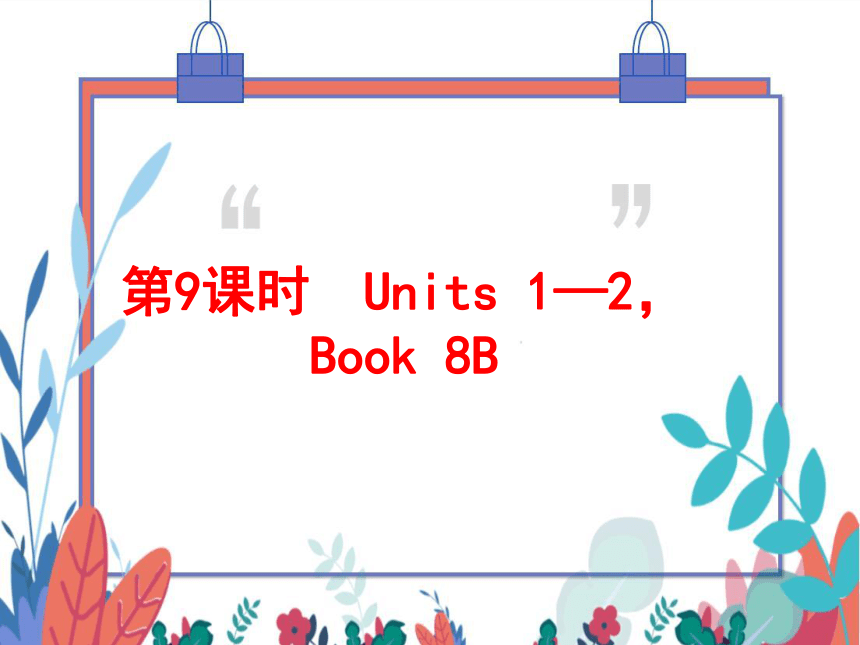 | |
| 格式 | ppt | ||
| 文件大小 | 836.5KB | ||
| 资源类型 | 试卷 | ||
| 版本资源 | 通用版 | ||
| 科目 | 英语 | ||
| 更新时间 | 2022-06-01 15:06:18 | ||
图片预览

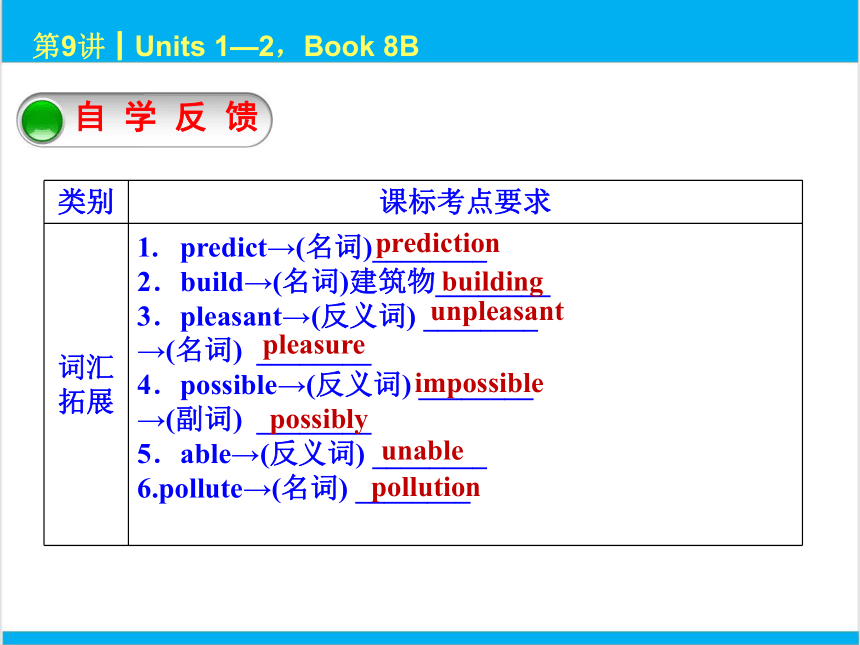

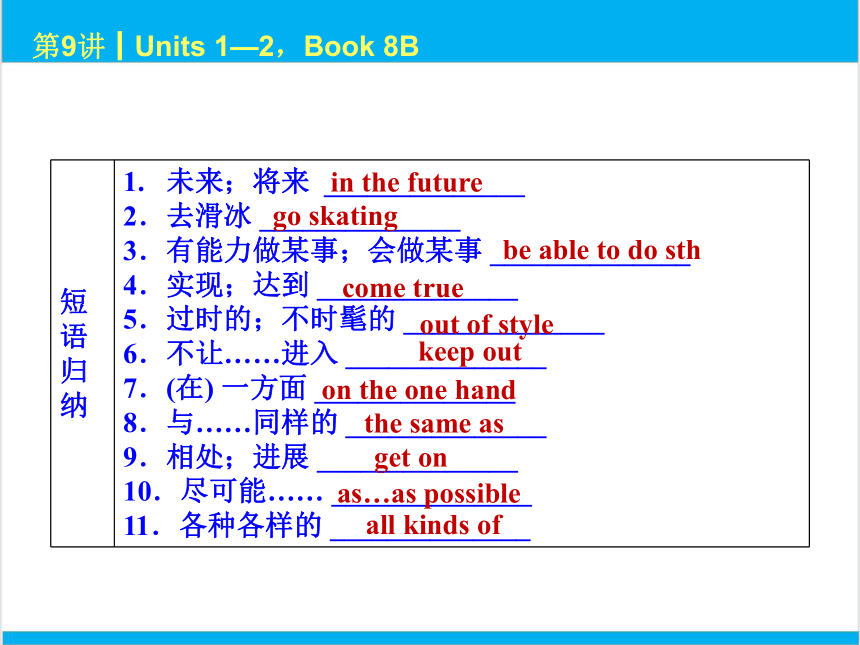
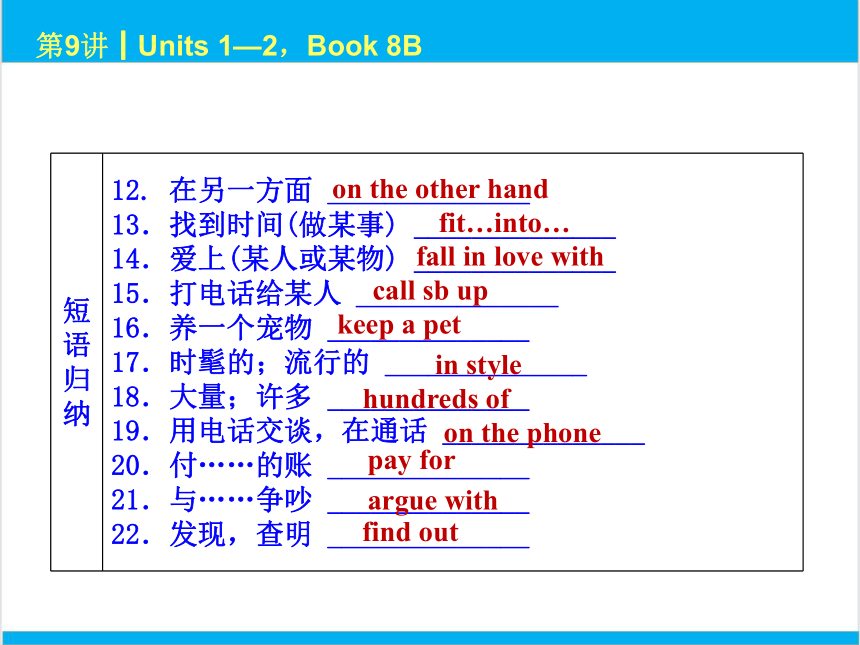

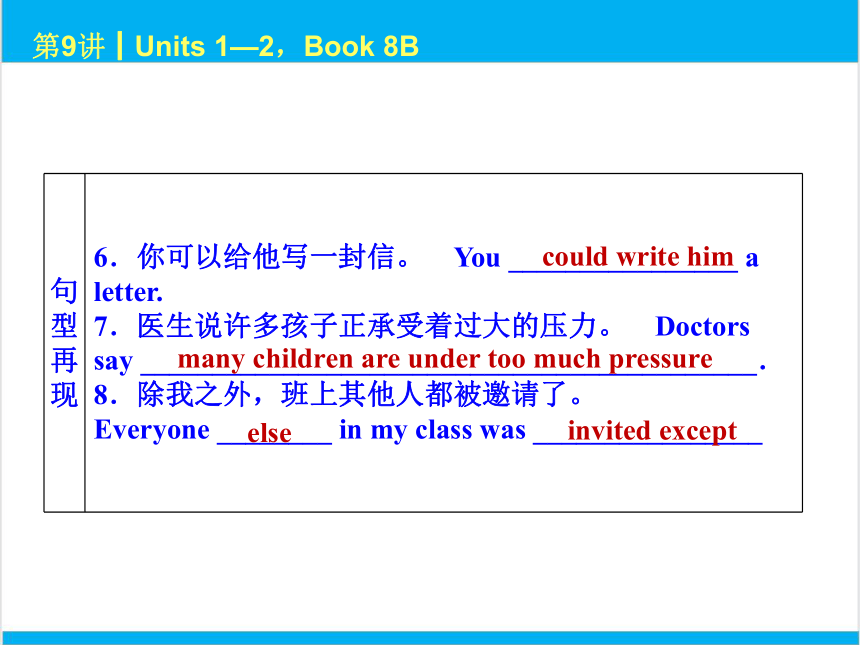
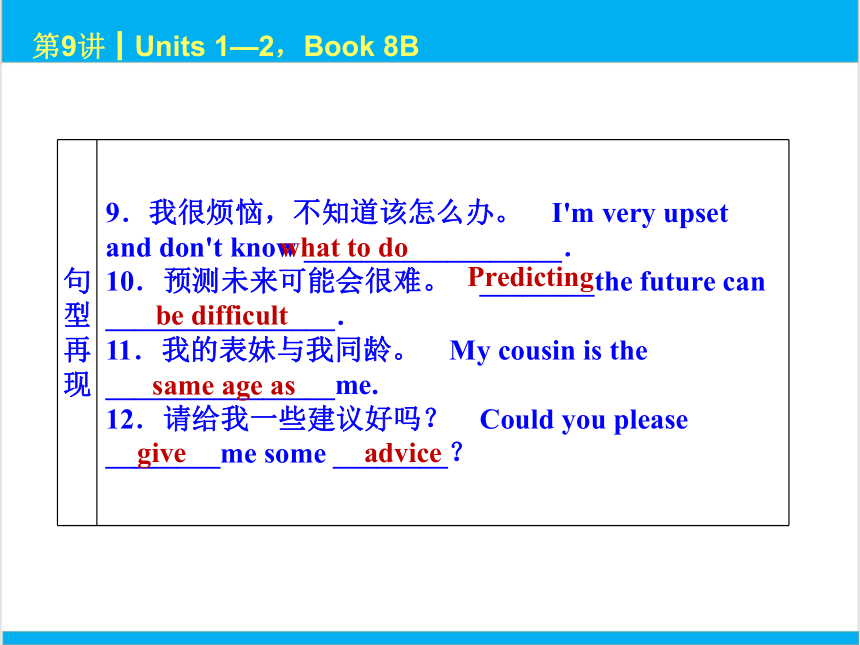

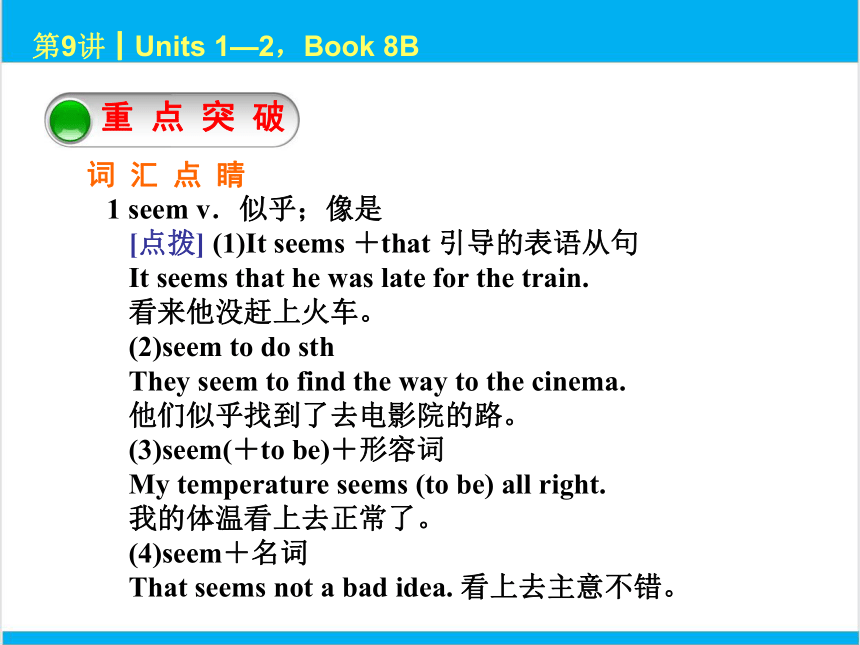
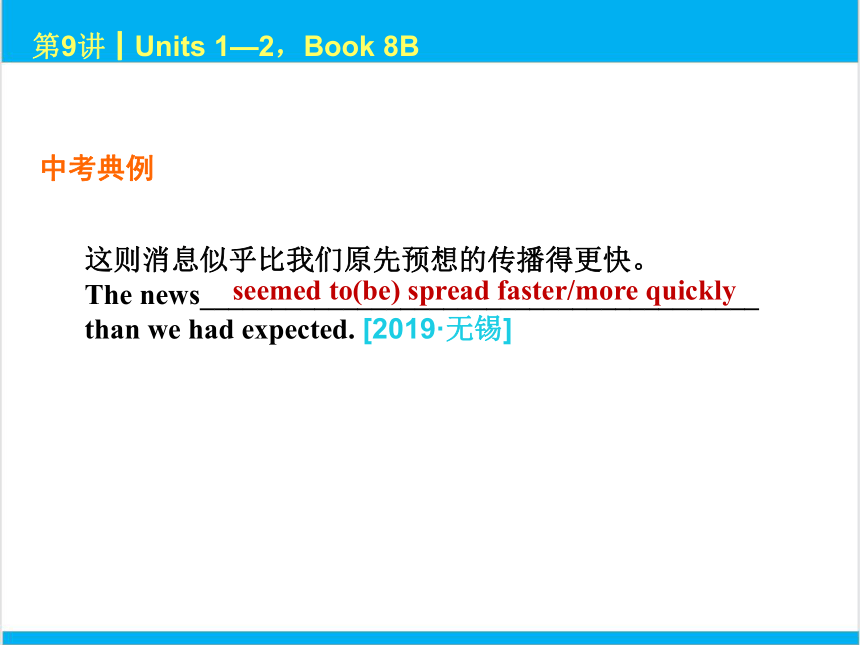
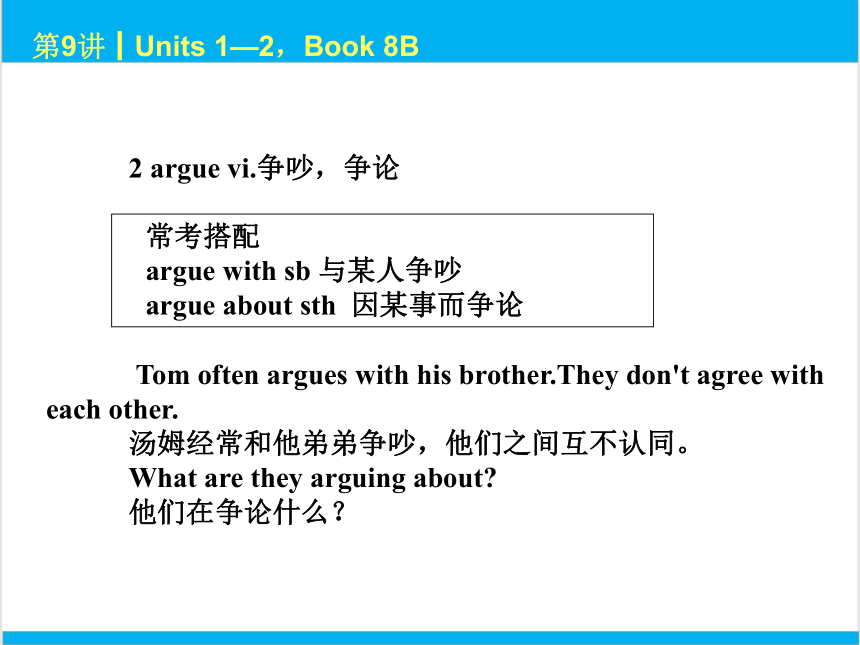
文档简介
(共33张PPT)
第9课时 Units 1—2,Book 8B
第9讲┃Units 1—2,Book 8B
自 学 反 馈
类别 课标考点要求
词汇
拓展 1. predict→(名词)________
2.build→(名词)建筑物________
3.pleasant→(反义词) ________
→(名词) ________
4.possible→(反义词) ________
→(副词) ________
5.able→(反义词) ________ 6.pollute→(名词) ________
prediction
unpleasant
pleasure
impossible
building
unable
possibly
pollution
第9讲┃Units 1—2,Book 8B
词汇
拓展 7.scientist→(名词)科学 ______
→(形容词) ________
8.they→(反身代词) ________
9.free→(名词) ________
10.write→(过去式) ________
→(过去分词) ________
science
themselves
freedom
wrote
scientific
written
第9讲┃Units 1—2,Book 8B
短语
归纳 1. 未来;将来 ______________
2.去滑冰 ______________
3.有能力做某事;会做某事 ______________
4.实现;达到 ______________
5.过时的;不时髦的 ______________
6.不让……进入 ______________
7.(在) 一方面 ______________
8.与……同样的 ______________
9.相处;进展 ______________
10.尽可能…… ______________
11.各种各样的 ______________
in the future
go skating
be able to do sth
come true
out of style
keep out
on the one hand
the same as
get on
as…as possible
all kinds of
短语
归纳 12. 在另一方面 ______________
13.找到时间(做某事) ______________
14.爱上(某人或某物) ______________
15.打电话给某人 ______________
16.养一个宠物 ______________
17.时髦的;流行的 ______________
18.大量;许多 ______________
19.用电话交谈,在通话 ______________
20.付……的账 ______________
21.与……争吵 ______________
22.发现,查明 ______________
on the other hand
fit…into…
fall in love with
call sb up
keep a pet
in style
hundreds of
on the phone
第9讲┃Units 1—2,Book 8B
pay for
argue with
find out
第9讲┃Units 1—2,Book 8B
句型
再现 1.“污染会减轻吗?” “不会。将来污染会更加严重。”
—________there be ________________?
—__________________. ____________ be more________.
2.小孩子将来会在家里用电脑学习。 Kids will ________________________ ____in the future.
3.怎么了? ________wrong
4.我父母想要我每天晚上待在家里。 My parents ________________________________________________________________________.
5.他认为计算机将永远不会被大部分人使用。 He thought that ________________________________________________________________________.
Will
less pollution
There will
No, there won't
pollution
study at home on computers
What's
want me to stay at home every night
computers would never be used by most people
第9讲┃Units 1—2,Book 8B
句型
再现 6.你可以给他写一封信。 You ________________ a letter.
7.医生说许多孩子正承受着过大的压力。 Doctors say ___________________________________________.
8.除我之外,班上其他人都被邀请了。
Everyone ________ in my class was ________________
could write him
many children are under too much pressure
else
invited except
第9讲┃Units 1—2,Book 8B
句型
再现 9.我很烦恼,不知道该怎么办。 I'm very upset and don't know __________________.
10.预测未来可能会很难。 ________the future can ________________.
11.我的表妹与我同龄。 My cousin is the ________________me.
12.请给我一些建议好吗? Could you please ________me some ________?
what to do
Predicting
be difficult
same age as
give
advice
第9讲┃Units 1—2,Book 8B
语法
结构 1.情态动词will, could, should的用法。
2.冠词的用法。
第9讲┃Units 1—2,Book 8B
词 汇 点 睛
1 seem v.似乎;像是
[点拨] (1)It seems +that 引导的表语从句
It seems that he was late for the train.
看来他没赶上火车。
(2)seem to do sth
They seem to find the way to the cinema.
他们似乎找到了去电影院的路。
(3)seem(+to be)+形容词
My temperature seems (to be) all right.
我的体温看上去正常了。
(4)seem+名词
That seems not a bad idea. 看上去主意不错。
重 点 突 破
第9讲┃Units 1—2,Book 8B
中考典例
这则消息似乎比我们原先预想的传播得更快。
The news_______________________________________
than we had expected. [2019·无锡]
seemed to(be) spread faster/more quickly
第9讲┃Units 1—2,Book 8B
2 argue vi.争吵,争论
Tom often argues with his brother.They don't agree with each other.
汤姆经常和他弟弟争吵,他们之间互不认同。
What are they arguing about
他们在争论什么?
常考搭配
argue with sb 与某人争吵
argue about sth 因某事而争论
第9讲┃Units 1—2,Book 8B
3 either adv.同样地(不……);也(不……)
adj.& pron.任一(的)
[点拨] (1)作代词,意为“(两者之中)任一,任何一个”,可与介词 of连用。either (of)作主语时,谓语动词用单数形式。
Either of the books is popular with the students.
(两本书中)任何一本书都受学生欢迎。
(2)作形容词,表示“(两者之中)任何一个的”,后接可数名词单数。
There are many trees on either side of the street.
街道两边有许多树。
第9讲┃Units 1—2,Book 8B
(3)作副词,表示“也”,用于否定句,通常置于句末,其前用逗号隔开。
I don't like blue and I don't like green, either.
我不喜欢蓝色,也不喜欢绿色。
[拓展] either…or…意为“或者……或者……;要么……要么……”。它在连接两个并列主语时,谓语动词必须遵循“就近原则”,与or后面的主语在人称和数上保持一致。类似的还有not only…but also (不但……而且……),neither…nor(既不……也不……)。但both…and(……和……都)连接两个并列主语时,谓语动词用复数形式。
Either you or Jim has a chance to visit the museum.
(连接并列主语)
要么你要么吉姆有机会去参观博物馆。
第9讲┃Units 1—2,Book 8B
中考典例
-Can I come this afternoon or tomorrow morning
-______is OK.I'm free today and tomorrow.
[2020·聊城]
A Either B Neither C Both D None
A
由“I'm free today and tomorrow.”可知this afternoon和tomorrow morning两个时间随便哪个都行。
解析
第9讲┃Units 1—2,Book 8B
4 paper n.纸;纸张
[点拨] 作“纸张”讲时是不可数名词,表示“一张纸”用a piece of paper。
Would you please give me two pieces of red paper
你能给我两张红纸吗?
[拓展] 作“试卷;论文”讲时是可数名词。
The teachers are marking exam papers.
老师们正在批阅试卷。
第9讲┃Units 1—2,Book 8B
5 return v.归还;送回
[点拨] return 相当于give back,常用于return sth to sb结构。
Don't forget to return the pen to me.
别忘了把钢笔还给我。
Return the book to the library. 把书归还给图书馆。
[拓展] return 还可表示“回来;返回”(=come/get back),常用于return to someplace结构。
She's returning to Australia tomorrow.
她明天要返回澳大利亚了。
I had to return to the store to look for my purse.
我不得不回到商店去找我的钱包。
[注意] return已含有back的意思,所以其后不能接back。
第9讲┃Units 1—2,Book 8B
巧 辩 异 同
1 such/so
词语 用法 常见结构
such 常用于修
饰名词 ①such +a/an+形容词+可数名词单数
②such(+形容词)+不可数名词或可数名词复数
第9讲┃Units 1—2,Book 8B
词语 用法 常见结构
so 常用于
修饰形
容词或
副词 ①so+形容词或副词
②so+形容词+a/an+可数名词单数③so+{
④so+that从句
当little 表示“年纪小的”之意时,可用于“such +little+名词”结构。
They were such little children that they couldn't clean the house. 这些孩子那么小,不能打扫房间。
many/few+可数名词复much/little+不可数名词
第9讲┃Units 1—2,Book 8B
中考典例
别再犯如此愚蠢的错误了,否则你只能另谋高就了。
Don't_____________________________________________
,or you will have to find another job.[2021·无锡]
make such silly mistakes/a silly mistake any more
第9讲┃Units 1—2,Book 8B
2 except/besides/but/except for
except “除……之外”,排除后者。着重强调在同类人或物中除去一个或几个,表示一种排除关系,有“减除”之意。
besides “除了……(还有……)”,不排除后者。指在整体中加入一部分,表示一种累加关系,有“加上”之意,常与other 连用。
but 和except的用法基本相同,但侧重指意义的几乎完整性,且习惯上用于every,all, any, nothing, no, nobody, who等词后。
except for except是排除同类;而except for是排除非同类,常在说明基本情况后,再从细节上加以修正。
第9讲┃Units 1—2,Book 8B
All of us passed the exam except John.
除了约翰未通过考试外,我们全都通过了。
I have a few friends besides you.
除你之外,我还有几个朋友。
She could do nothing but cry.
她除了哭没有别的办法。
The composition is very good except for a few spelling mistakes. 除了几处拼写错误之外,这篇作文整体还是不错的。(作文与拼写错误是非同类的)
第9讲┃Units 1—2,Book 8B
中考典例
-All the workers went home yesterday______Mr
White.Why
-Because he was on duty.[2021·兰州]
A except B besides Cexcept for D beside
A
由“Because he was on duty.”可知把Mr White排除在外了。
解析
第9讲┃Units 1—2,Book 8B
3 alone/lonely
(1)alone可以作形容词或副词,意为“单独地(的);孤独地(的)”,相当于by oneself;意思是“独自一人”、“没有同伴或助手”,表示客观情况。
She lives alone in the village.
她独自一人生活在那个村庄里。
He is alone in the house.
他独自一人在屋里。
第9讲┃Units 1—2,Book 8B
(2) lonely 只用作形容词, 带有感彩,形容因失去朋友、缺乏友爱和帮助而感到寂寞、甚至悲哀。
①作表语,意为“孤单的,孤独的”。
He feels lonely. 他感到孤独。
②作前置定语,修饰表示处所的名词,意为“荒凉的,偏僻的”。
The old man lives in a lonely mountain village.
这位老人住在一个偏僻的山村。
The old man lives alone, but he doesn't feel lonely.
那位老人独自生活,但他并不感到寂寞。
第9讲┃Units 1—2,Book 8B
中考典例
Though he is______at home,he doesn't feel______for he
has many things to do.
[2021·绥化]
A except B besides Cexcept for D beside
A
第9讲┃Units 1—2,Book 8B
4 be able to/can
两者均可表示有能力做某事,其后接动词原形,一般情况下可互换,其区别如下:
词语 词形 用法
be able to 有人称和数的变化 可用于多种时态,表示经过努力而有能力做某事。
can 没有人称和
数的变化 只有过去式could, could 还可表示请求、允许和推测,语气比can更委婉,而be able to 没有此用法。
第9讲┃Units 1—2,Book 8B
句 型 透 视
1 Will people use money in 100 years?一百年后人们还使用钱吗?
[点拨] in意为“在……之后”,常用于一般将来时,用how soon(多久以后)对其提问。
[辨析] in/after
单词 用法 句子时态
in 表示以现在为起点的将来某一段时间之后,后接时间段 用于将来时
after 可接时间点,也可接时间段 用于将来时或过去时(after+时间段)
第9讲┃Units 1—2,Book 8B
They'll leave for London in two weeks.
两周后他们将前往伦敦。
We'll come back after six o'clock.
我们将在六点之后回来。
She got there after three days.
她三天后到达了那里。
第9讲┃Units 1—2,Book 8B
2 I'm very upset and don't know what to do.
我非常不安,不知道该做什么。
[句型] “疑问词+不定式”结构常用在know, decide, find out, tell, forget, remember, see, understand等动词后作宾语,相当于宾语从句。当宾语从句的主语与主句的主语相同时,宾语从句可转换为“疑问词+不定式结构”。
She didn't know which blouse to buy. (=She didn't know which blouse she should buy.)
她不知道买哪件衬衫。
I'm thinking about what to say. (=I'm thinking about what I should say.) 我在考虑说什么。
第9讲┃Units 1—2,Book 8B
中考典例
-I will go to Harbin for my summer vacation.
What about you
-I haven't decided where______.[2020·济宁]
A go B went C going D to go
D
本题考查“疑问词(where/when/what time...)+不定式”结构,此结构可转换为宾语从句。
解析
第9讲┃Units 1—2,Book 8B
3 She also says that these children may find it hard to think for themselves when they are older.她还说等这些孩子长大后可能会发现难以独立思考。
[句型] “find it+形容词/名词+(for sb)to do sth” 意为“发现做某事(对某人来说)……”,其中it 作形式宾语,动词不定式短语作真正的宾语。think, believe, make, consider 等词也有类似用法。
[拓展] (1)常见的反身代词
第9讲┃Units 1—2,Book 8B
人称 单数 复数
第一人称 myself 我自己 ourselves 我们自己
第二人称 yourself 你自己 yourselves 你们自己
第三人称 himself 他自己
herself 她自己
itself 它自己 themselves 他(她,它)们自己
(2)常见搭配:by oneself 单独地,独自;enjoy oneself 玩得开心;help oneself to…随便吃/喝;teach oneself=learn by oneself 自学
第9课时 Units 1—2,Book 8B
第9讲┃Units 1—2,Book 8B
自 学 反 馈
类别 课标考点要求
词汇
拓展 1. predict→(名词)________
2.build→(名词)建筑物________
3.pleasant→(反义词) ________
→(名词) ________
4.possible→(反义词) ________
→(副词) ________
5.able→(反义词) ________ 6.pollute→(名词) ________
prediction
unpleasant
pleasure
impossible
building
unable
possibly
pollution
第9讲┃Units 1—2,Book 8B
词汇
拓展 7.scientist→(名词)科学 ______
→(形容词) ________
8.they→(反身代词) ________
9.free→(名词) ________
10.write→(过去式) ________
→(过去分词) ________
science
themselves
freedom
wrote
scientific
written
第9讲┃Units 1—2,Book 8B
短语
归纳 1. 未来;将来 ______________
2.去滑冰 ______________
3.有能力做某事;会做某事 ______________
4.实现;达到 ______________
5.过时的;不时髦的 ______________
6.不让……进入 ______________
7.(在) 一方面 ______________
8.与……同样的 ______________
9.相处;进展 ______________
10.尽可能…… ______________
11.各种各样的 ______________
in the future
go skating
be able to do sth
come true
out of style
keep out
on the one hand
the same as
get on
as…as possible
all kinds of
短语
归纳 12. 在另一方面 ______________
13.找到时间(做某事) ______________
14.爱上(某人或某物) ______________
15.打电话给某人 ______________
16.养一个宠物 ______________
17.时髦的;流行的 ______________
18.大量;许多 ______________
19.用电话交谈,在通话 ______________
20.付……的账 ______________
21.与……争吵 ______________
22.发现,查明 ______________
on the other hand
fit…into…
fall in love with
call sb up
keep a pet
in style
hundreds of
on the phone
第9讲┃Units 1—2,Book 8B
pay for
argue with
find out
第9讲┃Units 1—2,Book 8B
句型
再现 1.“污染会减轻吗?” “不会。将来污染会更加严重。”
—________there be ________________?
—__________________. ____________ be more________.
2.小孩子将来会在家里用电脑学习。 Kids will ________________________ ____in the future.
3.怎么了? ________wrong
4.我父母想要我每天晚上待在家里。 My parents ________________________________________________________________________.
5.他认为计算机将永远不会被大部分人使用。 He thought that ________________________________________________________________________.
Will
less pollution
There will
No, there won't
pollution
study at home on computers
What's
want me to stay at home every night
computers would never be used by most people
第9讲┃Units 1—2,Book 8B
句型
再现 6.你可以给他写一封信。 You ________________ a letter.
7.医生说许多孩子正承受着过大的压力。 Doctors say ___________________________________________.
8.除我之外,班上其他人都被邀请了。
Everyone ________ in my class was ________________
could write him
many children are under too much pressure
else
invited except
第9讲┃Units 1—2,Book 8B
句型
再现 9.我很烦恼,不知道该怎么办。 I'm very upset and don't know __________________.
10.预测未来可能会很难。 ________the future can ________________.
11.我的表妹与我同龄。 My cousin is the ________________me.
12.请给我一些建议好吗? Could you please ________me some ________?
what to do
Predicting
be difficult
same age as
give
advice
第9讲┃Units 1—2,Book 8B
语法
结构 1.情态动词will, could, should的用法。
2.冠词的用法。
第9讲┃Units 1—2,Book 8B
词 汇 点 睛
1 seem v.似乎;像是
[点拨] (1)It seems +that 引导的表语从句
It seems that he was late for the train.
看来他没赶上火车。
(2)seem to do sth
They seem to find the way to the cinema.
他们似乎找到了去电影院的路。
(3)seem(+to be)+形容词
My temperature seems (to be) all right.
我的体温看上去正常了。
(4)seem+名词
That seems not a bad idea. 看上去主意不错。
重 点 突 破
第9讲┃Units 1—2,Book 8B
中考典例
这则消息似乎比我们原先预想的传播得更快。
The news_______________________________________
than we had expected. [2019·无锡]
seemed to(be) spread faster/more quickly
第9讲┃Units 1—2,Book 8B
2 argue vi.争吵,争论
Tom often argues with his brother.They don't agree with each other.
汤姆经常和他弟弟争吵,他们之间互不认同。
What are they arguing about
他们在争论什么?
常考搭配
argue with sb 与某人争吵
argue about sth 因某事而争论
第9讲┃Units 1—2,Book 8B
3 either adv.同样地(不……);也(不……)
adj.& pron.任一(的)
[点拨] (1)作代词,意为“(两者之中)任一,任何一个”,可与介词 of连用。either (of)作主语时,谓语动词用单数形式。
Either of the books is popular with the students.
(两本书中)任何一本书都受学生欢迎。
(2)作形容词,表示“(两者之中)任何一个的”,后接可数名词单数。
There are many trees on either side of the street.
街道两边有许多树。
第9讲┃Units 1—2,Book 8B
(3)作副词,表示“也”,用于否定句,通常置于句末,其前用逗号隔开。
I don't like blue and I don't like green, either.
我不喜欢蓝色,也不喜欢绿色。
[拓展] either…or…意为“或者……或者……;要么……要么……”。它在连接两个并列主语时,谓语动词必须遵循“就近原则”,与or后面的主语在人称和数上保持一致。类似的还有not only…but also (不但……而且……),neither…nor(既不……也不……)。但both…and(……和……都)连接两个并列主语时,谓语动词用复数形式。
Either you or Jim has a chance to visit the museum.
(连接并列主语)
要么你要么吉姆有机会去参观博物馆。
第9讲┃Units 1—2,Book 8B
中考典例
-Can I come this afternoon or tomorrow morning
-______is OK.I'm free today and tomorrow.
[2020·聊城]
A Either B Neither C Both D None
A
由“I'm free today and tomorrow.”可知this afternoon和tomorrow morning两个时间随便哪个都行。
解析
第9讲┃Units 1—2,Book 8B
4 paper n.纸;纸张
[点拨] 作“纸张”讲时是不可数名词,表示“一张纸”用a piece of paper。
Would you please give me two pieces of red paper
你能给我两张红纸吗?
[拓展] 作“试卷;论文”讲时是可数名词。
The teachers are marking exam papers.
老师们正在批阅试卷。
第9讲┃Units 1—2,Book 8B
5 return v.归还;送回
[点拨] return 相当于give back,常用于return sth to sb结构。
Don't forget to return the pen to me.
别忘了把钢笔还给我。
Return the book to the library. 把书归还给图书馆。
[拓展] return 还可表示“回来;返回”(=come/get back),常用于return to someplace结构。
She's returning to Australia tomorrow.
她明天要返回澳大利亚了。
I had to return to the store to look for my purse.
我不得不回到商店去找我的钱包。
[注意] return已含有back的意思,所以其后不能接back。
第9讲┃Units 1—2,Book 8B
巧 辩 异 同
1 such/so
词语 用法 常见结构
such 常用于修
饰名词 ①such +a/an+形容词+可数名词单数
②such(+形容词)+不可数名词或可数名词复数
第9讲┃Units 1—2,Book 8B
词语 用法 常见结构
so 常用于
修饰形
容词或
副词 ①so+形容词或副词
②so+形容词+a/an+可数名词单数③so+{
④so+that从句
当little 表示“年纪小的”之意时,可用于“such +little+名词”结构。
They were such little children that they couldn't clean the house. 这些孩子那么小,不能打扫房间。
many/few+可数名词复much/little+不可数名词
第9讲┃Units 1—2,Book 8B
中考典例
别再犯如此愚蠢的错误了,否则你只能另谋高就了。
Don't_____________________________________________
,or you will have to find another job.[2021·无锡]
make such silly mistakes/a silly mistake any more
第9讲┃Units 1—2,Book 8B
2 except/besides/but/except for
except “除……之外”,排除后者。着重强调在同类人或物中除去一个或几个,表示一种排除关系,有“减除”之意。
besides “除了……(还有……)”,不排除后者。指在整体中加入一部分,表示一种累加关系,有“加上”之意,常与other 连用。
but 和except的用法基本相同,但侧重指意义的几乎完整性,且习惯上用于every,all, any, nothing, no, nobody, who等词后。
except for except是排除同类;而except for是排除非同类,常在说明基本情况后,再从细节上加以修正。
第9讲┃Units 1—2,Book 8B
All of us passed the exam except John.
除了约翰未通过考试外,我们全都通过了。
I have a few friends besides you.
除你之外,我还有几个朋友。
She could do nothing but cry.
她除了哭没有别的办法。
The composition is very good except for a few spelling mistakes. 除了几处拼写错误之外,这篇作文整体还是不错的。(作文与拼写错误是非同类的)
第9讲┃Units 1—2,Book 8B
中考典例
-All the workers went home yesterday______Mr
White.Why
-Because he was on duty.[2021·兰州]
A except B besides Cexcept for D beside
A
由“Because he was on duty.”可知把Mr White排除在外了。
解析
第9讲┃Units 1—2,Book 8B
3 alone/lonely
(1)alone可以作形容词或副词,意为“单独地(的);孤独地(的)”,相当于by oneself;意思是“独自一人”、“没有同伴或助手”,表示客观情况。
She lives alone in the village.
她独自一人生活在那个村庄里。
He is alone in the house.
他独自一人在屋里。
第9讲┃Units 1—2,Book 8B
(2) lonely 只用作形容词, 带有感彩,形容因失去朋友、缺乏友爱和帮助而感到寂寞、甚至悲哀。
①作表语,意为“孤单的,孤独的”。
He feels lonely. 他感到孤独。
②作前置定语,修饰表示处所的名词,意为“荒凉的,偏僻的”。
The old man lives in a lonely mountain village.
这位老人住在一个偏僻的山村。
The old man lives alone, but he doesn't feel lonely.
那位老人独自生活,但他并不感到寂寞。
第9讲┃Units 1—2,Book 8B
中考典例
Though he is______at home,he doesn't feel______for he
has many things to do.
[2021·绥化]
A except B besides Cexcept for D beside
A
第9讲┃Units 1—2,Book 8B
4 be able to/can
两者均可表示有能力做某事,其后接动词原形,一般情况下可互换,其区别如下:
词语 词形 用法
be able to 有人称和数的变化 可用于多种时态,表示经过努力而有能力做某事。
can 没有人称和
数的变化 只有过去式could, could 还可表示请求、允许和推测,语气比can更委婉,而be able to 没有此用法。
第9讲┃Units 1—2,Book 8B
句 型 透 视
1 Will people use money in 100 years?一百年后人们还使用钱吗?
[点拨] in意为“在……之后”,常用于一般将来时,用how soon(多久以后)对其提问。
[辨析] in/after
单词 用法 句子时态
in 表示以现在为起点的将来某一段时间之后,后接时间段 用于将来时
after 可接时间点,也可接时间段 用于将来时或过去时(after+时间段)
第9讲┃Units 1—2,Book 8B
They'll leave for London in two weeks.
两周后他们将前往伦敦。
We'll come back after six o'clock.
我们将在六点之后回来。
She got there after three days.
她三天后到达了那里。
第9讲┃Units 1—2,Book 8B
2 I'm very upset and don't know what to do.
我非常不安,不知道该做什么。
[句型] “疑问词+不定式”结构常用在know, decide, find out, tell, forget, remember, see, understand等动词后作宾语,相当于宾语从句。当宾语从句的主语与主句的主语相同时,宾语从句可转换为“疑问词+不定式结构”。
She didn't know which blouse to buy. (=She didn't know which blouse she should buy.)
她不知道买哪件衬衫。
I'm thinking about what to say. (=I'm thinking about what I should say.) 我在考虑说什么。
第9讲┃Units 1—2,Book 8B
中考典例
-I will go to Harbin for my summer vacation.
What about you
-I haven't decided where______.[2020·济宁]
A go B went C going D to go
D
本题考查“疑问词(where/when/what time...)+不定式”结构,此结构可转换为宾语从句。
解析
第9讲┃Units 1—2,Book 8B
3 She also says that these children may find it hard to think for themselves when they are older.她还说等这些孩子长大后可能会发现难以独立思考。
[句型] “find it+形容词/名词+(for sb)to do sth” 意为“发现做某事(对某人来说)……”,其中it 作形式宾语,动词不定式短语作真正的宾语。think, believe, make, consider 等词也有类似用法。
[拓展] (1)常见的反身代词
第9讲┃Units 1—2,Book 8B
人称 单数 复数
第一人称 myself 我自己 ourselves 我们自己
第二人称 yourself 你自己 yourselves 你们自己
第三人称 himself 他自己
herself 她自己
itself 它自己 themselves 他(她,它)们自己
(2)常见搭配:by oneself 单独地,独自;enjoy oneself 玩得开心;help oneself to…随便吃/喝;teach oneself=learn by oneself 自学
